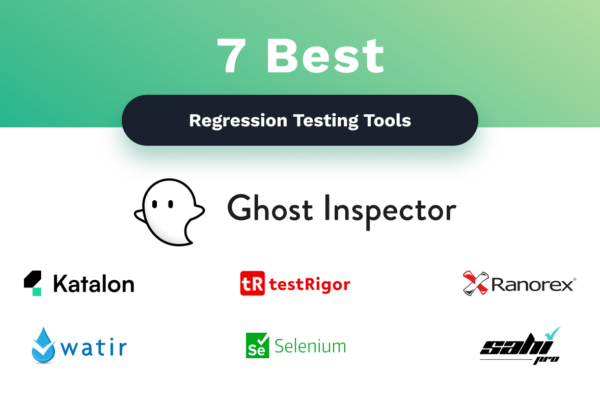QA engineers and developers constantly worry that new updates will hinder the functionality of their applications. Regression testing tools prevent this and ensure that applications run smoothly after a code update.
Most QA teams use automated regression testing software to save time and money while speeding up the release cycle. However, these benefits only apply when you use a web testing tool that suits your use cases.
To help you better understand each solution and pick the ideal platform, we’ve compiled and compared the top seven regression testing tools, their key features, and pricing plans.
But first, let’s explore what regression testing is and why it’s important.
What is regression testing?
Regression testing is used to check if recent code updates have introduced new bugs or hurt product quality. It is a type of software testing that verifies that the old code still works as expected after integrating new code.
Software or applications need code changes for feature enhancements, optimization, bug fixes, or integration with other systems. Without regression testing, new updates may introduce errors that can lead to data loss, operational failures, or a poor user experience.
The main benefits of regression testing include:
- Maintaining software quality and stability
- Ensuring that updates or patches do not introduce new bugs
- Improving user satisfaction by delivering a high-quality product
- Facilitating continuous development and deployment
By regularly conducting regression tests and using QA tools, development and product teams can release software that remains reliable even after updates or changes.
Table of Contents
- The 7 best regression testing tools
- Factors to consider when choosing the best regression testing tool
- Optimize regression testing with Ghost Inspector
- Regression Testing FAQs
Automate regression testing with
Ghost Inspector
Our 14 day free trial gives you and your team full access. Create tests in minutes. No credit card required.
The 7 best regression testing tools
Here’s a breakdown of the top 7 regression testing tools:
1. Ghost Inspector
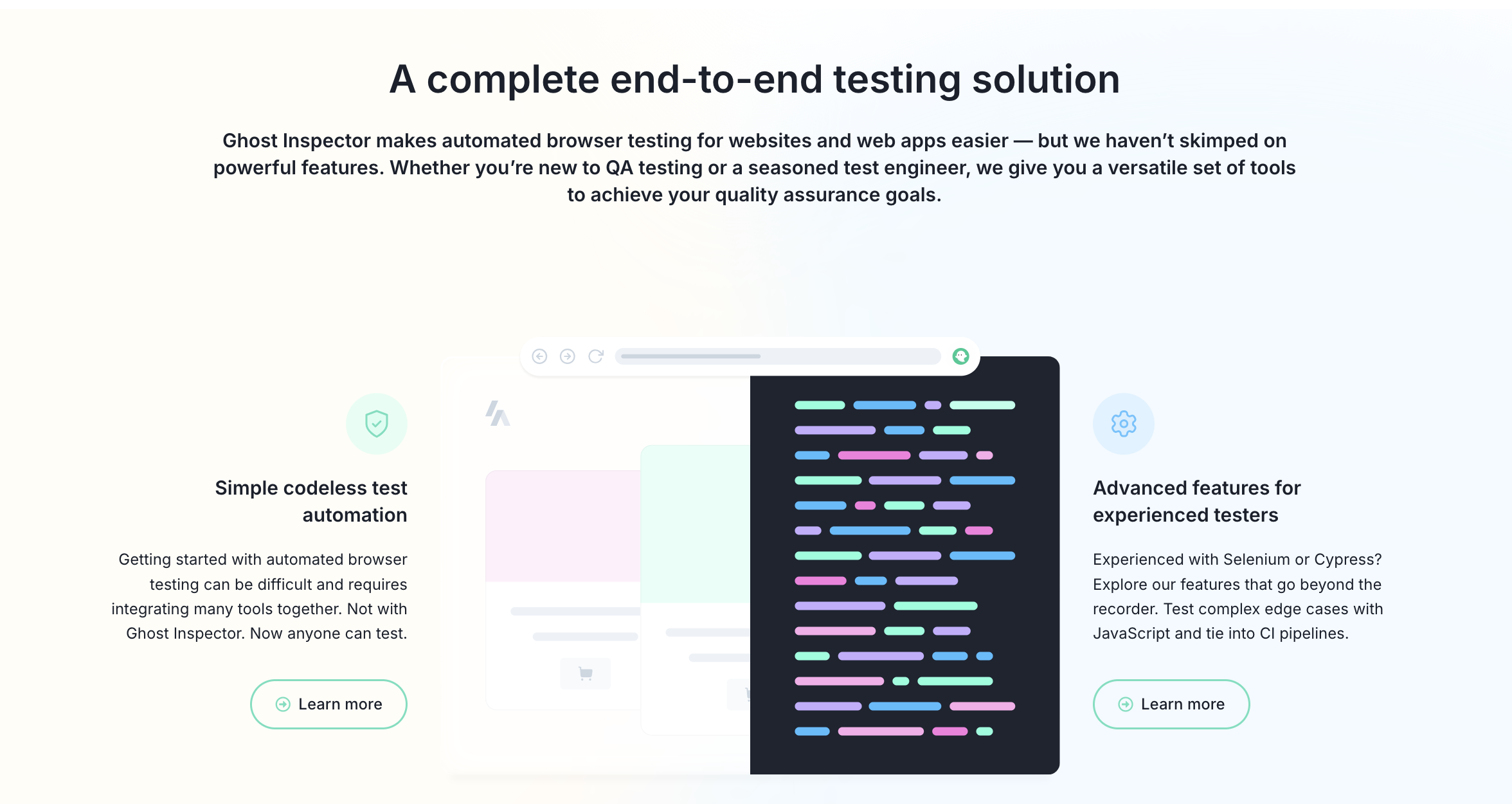
Ghost Inspector is a powerful tool designed to automate and simplify regression testing for websites and web applications. It caters to technical and non-technical testers as users can create tests without writing code.
The platform has a visual drag and drop editor for rapid test creation for business professionals. It also reduces developer workload since they don’t have to write test scripts from scratch. But, for development teams that want to configure complex scenarios, it has JavaScript support
Ghost Inspector has a user-friendly interface that enables teams to execute multiple regression tests to verify that their web apps perform as expected. It also integrates effortlessly into development pipelines.
Key features
- Codeless test automation: Users can create and maintain regression test suites without writing code, making test automation more accessible. It also has advanced testing features for complex use cases.
- Comprehensive testing: Supports visual regression testing, cross-browser testing, and geolocation testing.
- Parallel testing: Offers unlimited parallel test execution without additional costs to significantly reduce testing time and support frequent releases.
- Quick test initiation: Simplifies the setup process using a visual editor so teams can start testing within minutes. The tool also offers implementation calls, during which the team will configure tests for your specific app or website.
- Detailed bug reports: Provides comprehensive reports highlighting issues, so development teams can quickly fix bugs and use a data-driven testing approach.
- Immediate notifications: Users get instant notifications if tests fail via app integrations with Slack, Microsoft Teams, Jira, GitHub, and more.
- Extensive integrations: Integrates with most popular testing, debugging, and deployment platforms.
Pricing: Ghost Inspector offers four pricing plans, starting at $109 per month for 10,000 test runs per month and five team members. It is the only automated regression testing software that allows unlimited parallel tests.
Users also get a free 14-day trial with all the premium features unlocked. Enterprise customers get custom quotes.
2. Katalon Studio
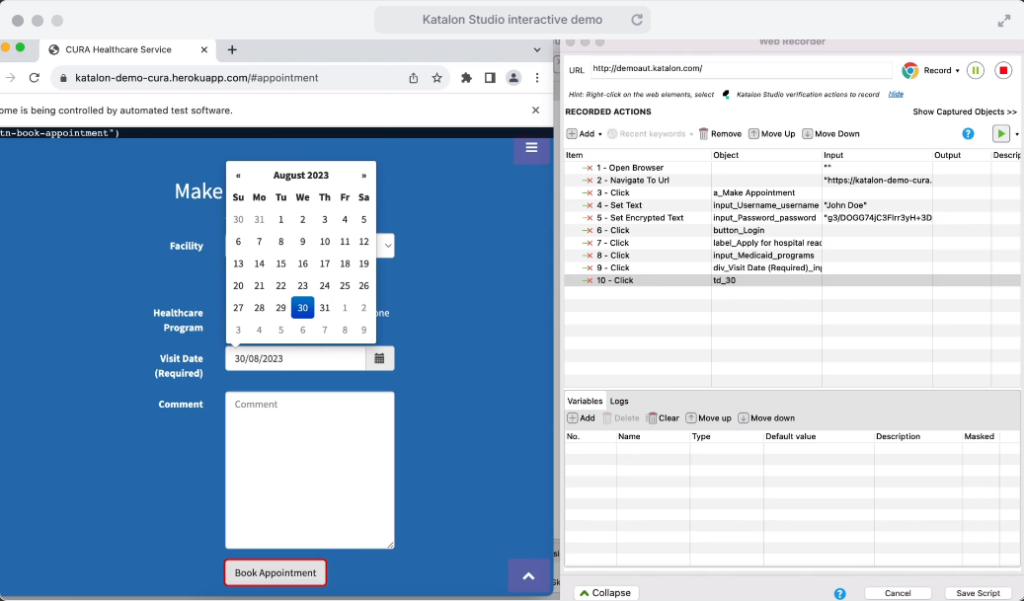
Katalon Studio is a testing platform that supports web, API, mobile, and desktop application testing. It is versatile and easy to use, offering comprehensive features for automated testing.
Key features
- Cross-platform testing: Supports regression and functional testing across multiple environments, including web, mobile, and desktop applications.
- Real device cloud: Provides a wide range of real devices to remotely test functionality and behavioral patterns of mobile apps.
- Integrated environment: Offers a unified UI and API/Web services testing environment.
- Reusable test artifacts: Enhances test efficiency by allowing the reuse of test scripts, reducing the effort needed to write tests from scratch.
- Smart wait function: Automatically waits for web elements to become ready before performing actions, reducing test flakiness.
- AI‑powered test creation and maintenance: Includes AI‑native capabilities to speed test authoring and improve reliability.
Pricing: Katalon Studio offers a free version with basic functionalities for small teams. Paid plans start at $1,000/year per user (Create tier) with limited features. Most teams will require the Enterprise plan, which starts around $2,000/year per user and includes full platform access, advanced parallel testing, and enterprise integrations.
3. Selenium
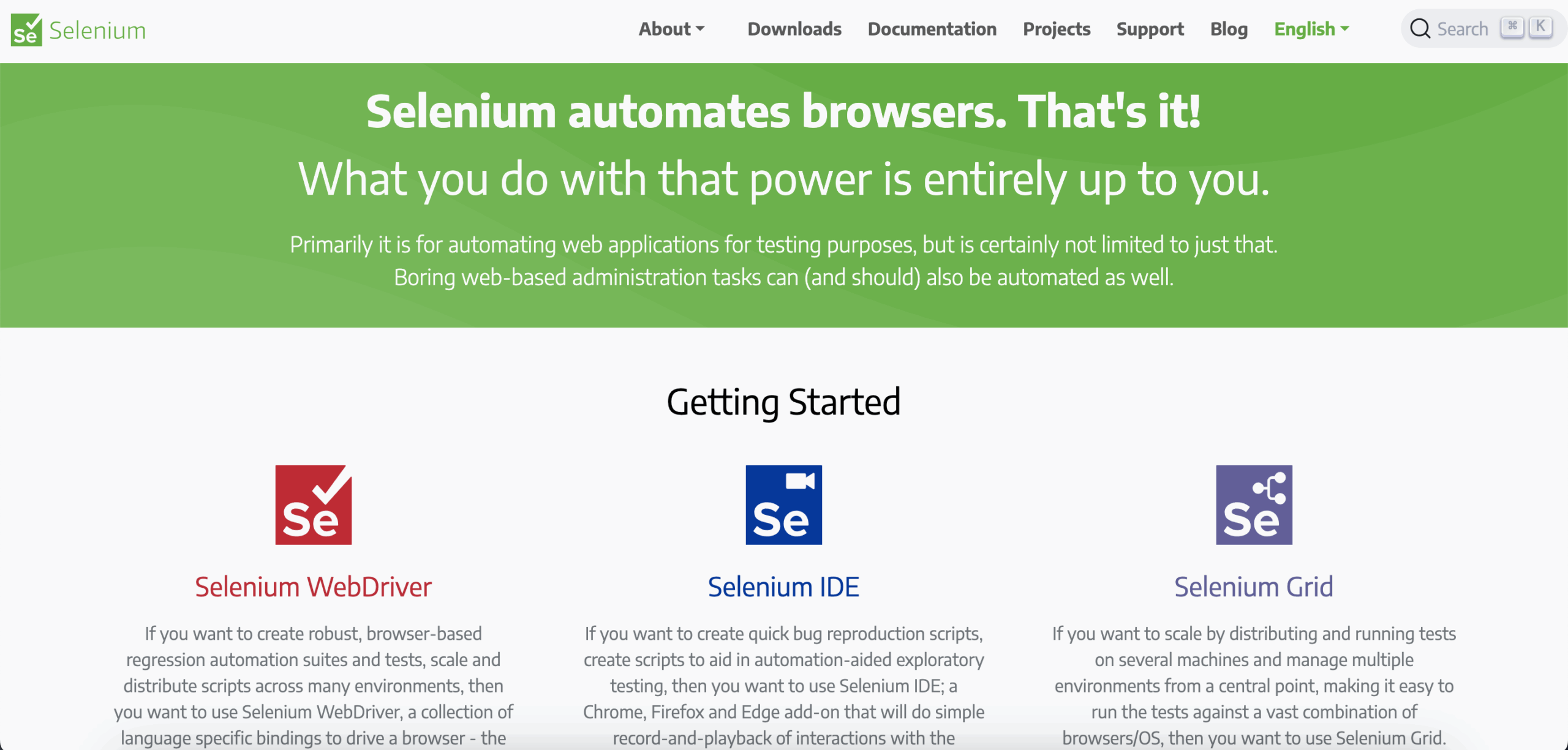
Selenium is an open-source framework for automating web browsers. It provides tools and libraries for testing web applications across different browsers and platforms.
Key features
- Cross-browser testing: Enables automated and manual testing on multiple browsers and operating systems.
- Flexible test writing: Supports various programming languages, including Java, C#, Python, and Ruby.
- Integration with other tools: Easily integrates with other software frameworks and tools for continuous integration and testing.
- Large community support: Has a vast and active community offering resources and support.
Pricing: Selenium is open source and free to use.
4. Watir
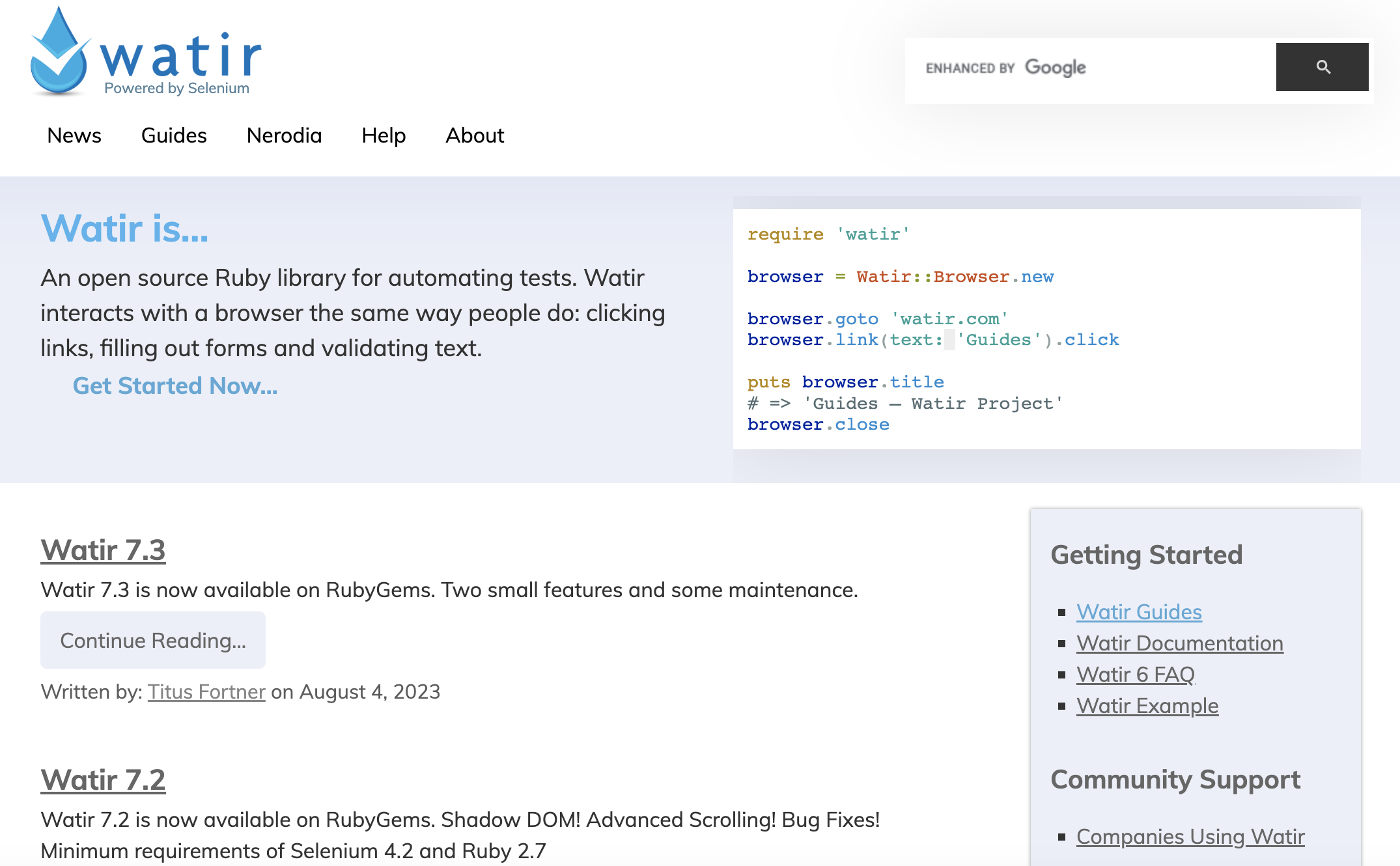
Web Application Testing in Ruby or Watir is an open-source, Ruby-based framework for user-centric automated web testing. It is among the most popular regression testing tools for open-source testers and uses Selenium for browser automation.
Key features
- Simple syntax: Utilizes Ruby’s natural syntax to write test scripts.
- Supports multiple browsers: Allows testing on various browsers, including Firefox, Chrome, and Safari.
- Integration capabilities: Integrates well with testing frameworks such as RSpec, Cucumber, and Test/Unit.
- Strong community: Offers robust community support, providing resources and help for newcomers and experienced users.
Pricing: Watir is completely free to use.
5. Sahi Pro
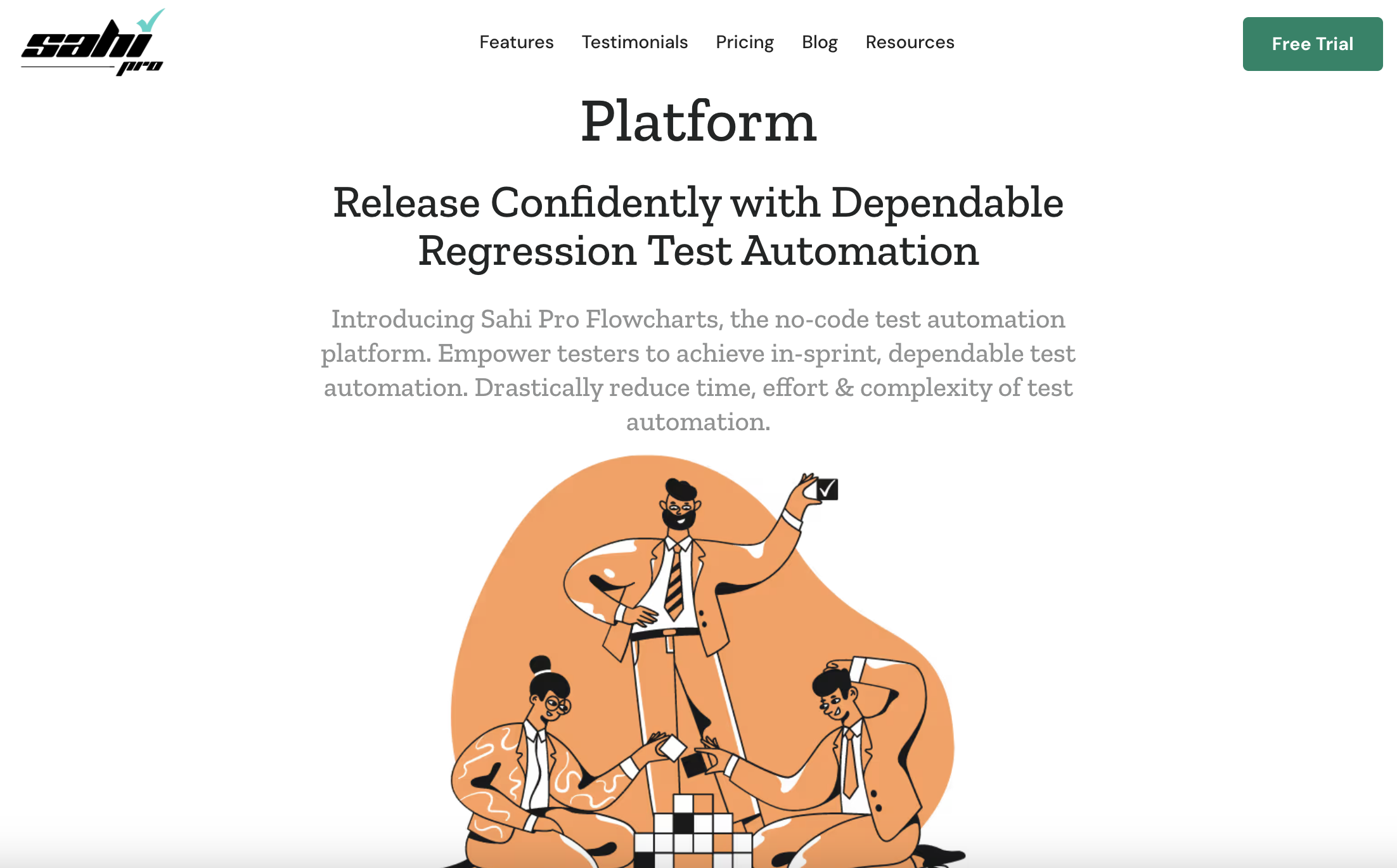
Sahi Pro is a test automation suite for website, desktop application, and mobile application testing. It simplifies the regression testing process, particularly for complex web apps.
Key features
- Easy recorder: Provides an easy-to-use recording feature for creating test scripts without deep technical knowledge.
- Multi-browser support: Executes tests across different browsers efficiently.
- Automatic dynamic content handling: Supports complex web 2.0 applications and dynamic content.
- Inbuilt reporting and logging: Offers detailed reports and logs for better insights.
Pricing: Sahi Pro offers a Web edition starting at approximately US $1,495/year per concurrent license. Larger team or enterprise packages (including mobile, desktop, or SAP automation) require custom quotes.
6. Ranorex Studio
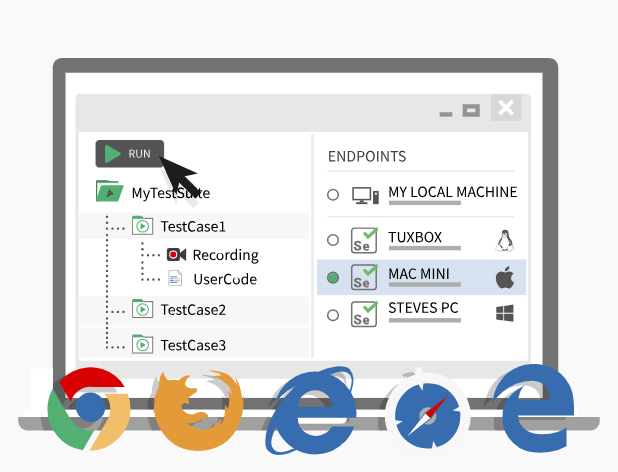
Ranorex Studio is a powerful automation tool for the functional testing of desktop, web, and mobile applications. It can accommodate users of all skill levels, from beginners to experts.
Key features
- Codeless test creation: Allows for easy low-code test setup.
- Object recognition engine: Ensures reliable execution by accurately identifying UI elements.
- Integrated development environment: Supports detailed test creation and management by integrating with other tools in the regression testing process.
- Cross-platform testing: Enables testing across various platforms and mobile devices.
- AI‑enhanced object recognition: Ranorex uses machine‑learning to improve UI element identification and reduce flaky tests.
Pricing: Licenses start at approximately US $4,650/year for the Enterprise edition. Pricing varies by license type (node‑locked vs floating) and team size. Contact sales for a full quote.
7. testRigor
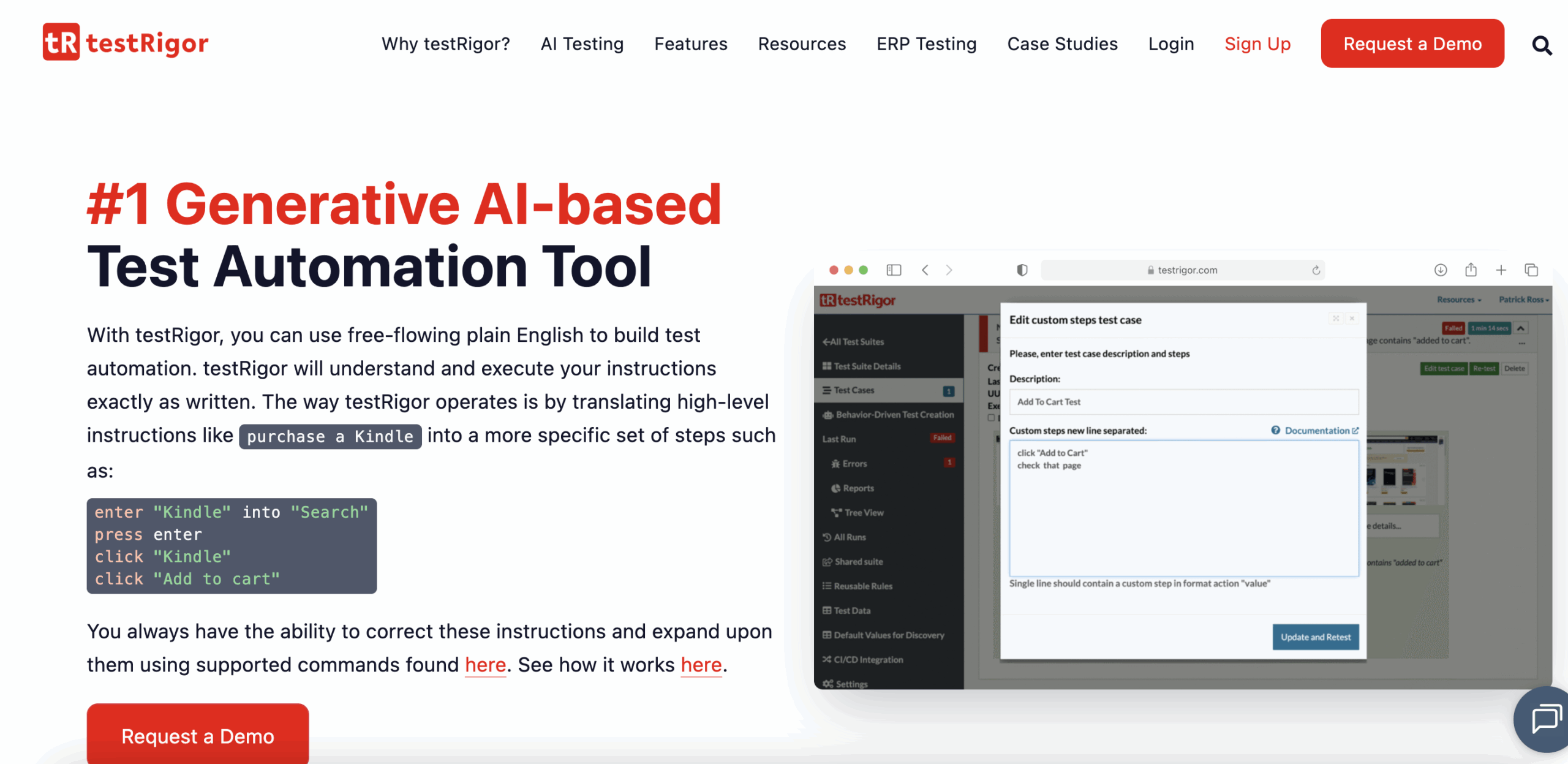
testRigor is a generative AI-based test automation tool that uses a codeless approach, so non-technical users can easily create regression test suites.
Key features
- Codeless test creation: Enables rapid test development without the need for programming skills.
- AI-Assisted test maintenance: Uses artificial intelligence to automatically update tests based on application changes, reducing the maintenance burden.
- Comprehensive test coverage: Users can perform a wide range of functional tests, from user interface to backend processes.
- Integration: Seamless integrations with CI/CD pipelines and various development tools, facilitating continuous testing and deployment.
- Generative‑AI driven automation: Tests can be built in plain English, self‑healing and adaptive using AI to reduce maintenance.
Pricing: testRigor offers a free public tier with unlimited users and test cases, limited to one parallel test and public test visibility. Paid plans vary based on the number of parallel tests and infrastructure requirements. Private and enterprise plans require contacting the sales team for a custom quote.
These regression testing tools are powerful and can help testers identify and solve errors that harm website or app functionality. Each tool has dynamic features that can improve your regression testing process, so how do you know which one is right for your team?
Factors to consider when choosing the best regression testing tool
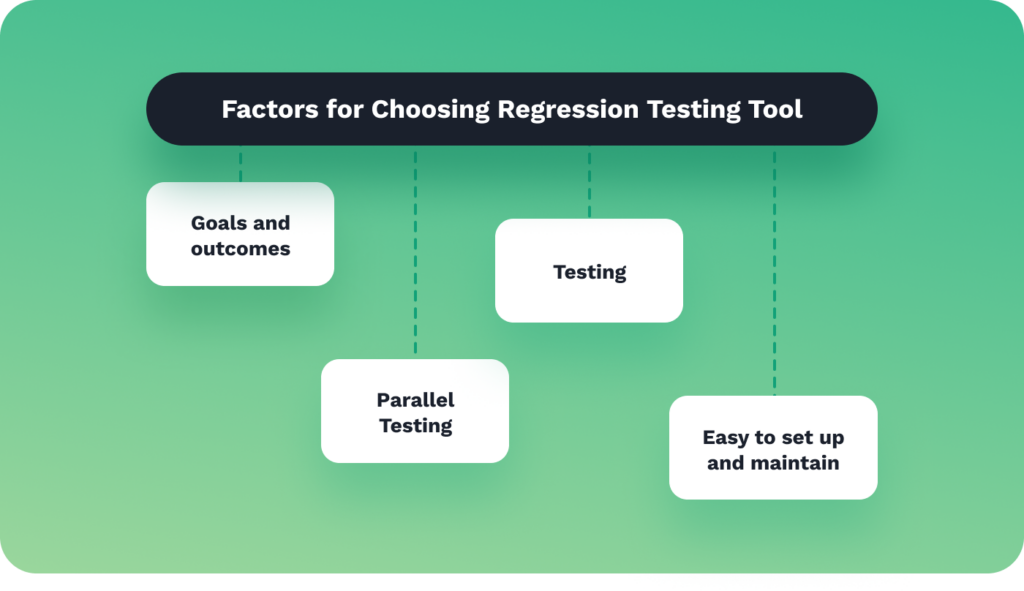
The ideal automated regression testing software can make a significant difference in efficiency, coverage, and the overall success of your testing efforts. Consider these three factors when choosing between popular regression testing tools:
Goals and outcomes
Before selecting a regression testing tool, you must clearly define the problems you want to solve and the desired outcomes. Decide whether your focus is on speed, accuracy, coverage, or a combination.
The ideal tool should address your current testing challenges and align with your project’s long-term goals, such as improving user experience or reducing time to market.
Integrations
Look for regression testing tools that integrate with your existing CI/CD pipeline, version control systems, and project management tools. This ensures a well-structured workflow and unlocks the full potential of automation in your software development process.
Easy to set up and maintain
According to a recent report, setting up the test environment is among the most time-consuming activities for testing teams. To reduce the learning curve and maintenance effort, you need a tool with a user-friendly interface that is easy to install and configure.
It should allow you to set up and run regression and functional tests without disrupting existing processes. Also, consider the level of support provided for updates and troubleshooting, as this affects the tool’s long-term usability and effectiveness.
Parallel testing
The capability to run tests in parallel significantly reduces the execution time of your regression testing process. Running multiple tests at once helps you get faster feedback on how changes impact your application and facilitate agile development.
This feature is critical for companies focusing on time to market since it enables more frequent releases without compromising product quality.
Which regression testing tool is best for your business?
Ultimately, the right tool for your business depends on how your team uses it and what your testing goals are. For example, if your team values codeless test automation, then Ghost Inspector, Katalon Studio, or testRigor are excellent choices.
For teams that want open-source solutions and programming language support, Selenium offers flexibility and extensive integration capabilities.
If parallel testing is a priority, Ghost Inspector is the obvious choice, with unlimited parallel tests at no extra charge.
Do your research and pick the automated regression testing software that integrates with your workflow smoothly, aligns with your goals, and scales to meet project demands.
Optimize regression testing with Ghost Inspector
QA testers, product managers, and developers rely on regression testing tools to protect existing functionality and support continuous delivery. Choosing the right test automation tool is essential to improving product quality while reducing maintenance effort and the risk of human error.
Ghost Inspector is a low-code, easy-to-use solution that streamlines test creation and supports a wide range of automated testing use cases, including functional and visual testing. It enables fast, reliable test execution across different environments, making it ideal for teams that value efficiency and stability in their regression testing process.
With unlimited parallel test runs included, Ghost Inspector is built to scale alongside your development workflow. Start your free 14-day trial or book a free live demo to see how Ghost Inspector can elevate your testing process.
Regression Testing Frequently Asked Questions (FAQ)
Which regression tools are best for non-technical users?
Ghost Inspector, testRigor, Katalon, and Sahi Pro offer low-code or no-code interfaces suitable for non-developers.
Selenium, Watir, Playwright, and TestComplete require programming knowledge and are better suited for technical teams.
Do any of these tools support visual regression testing?
Ghost Inspector includes screenshots and video playback for visual comparisons.
Katalon and testRigor also offer visual testing workflows.
Playwright supports screenshot and snapshot comparison for visual regression.
Selenium, Watir, and Sahi Pro do not include built-in visual testing features and require custom setups or integrations.
How do these tools handle parallel regression testing?
Ghost Inspector provides unlimited parallel test execution on all plans.
Playwright and TestComplete allow configurable parallel execution depending on setup.
Katalon, testRigor, and Ranorex support parallel testing with plan-based limits.
Selenium, Watir, and Sahi Pro can run tests in parallel but require additional configuration.
What if I need desktop or mobile regression testing?
Ranorex and TestComplete support desktop application testing in addition to web.
Katalon and testRigor support mobile testing through integrations like Appium.
Ghost Inspector, Selenium, Watir, and Playwright are focused on web application testing only.
Are these tools suitable for CI/CD automation?
Yes, all nine tools integrate with CI/CD systems like Jenkins, GitHub Actions, and GitLab CI to support automated regression testing in your deployment workflows.
Automate regression testing
with Ghost Inspector
Our 14 day free trial gives you and your team full access. Create tests in minutes. No credit card required.


